Sustainable Systems: Energy Efficiency of Refrigerators Report
VerifiedAdded on 2022/12/28
|8
|1434
|31
Report
AI Summary
This report examines the energy efficiency of refrigerators, addressing energy consumption, environmental impact, and cost-benefit analysis. It explores the problem of high energy use in refrigerators, sourced from non-renewable resources, and the appliance's environmental impact. The report provides product-related information, including energy consumption rates and costs, and discusses energy sources, focusing on electrical energy generated from non-renewable resources. It also highlights organizations in Australia that promote energy efficiency, such as Epson Australia and the Energy Efficiency Council, and outlines opportunities to decrease energy consumption through smart housing techniques, energy-efficient appliances, and renewable energy sources. A cost-benefit analysis compares energy-efficient refrigerators with alternative energy sources. The conclusion emphasizes the importance of purchasing energy-efficient products and using renewable energy sources to reduce energy consumption and dependence on non-renewable resources. The report includes references to support the findings.
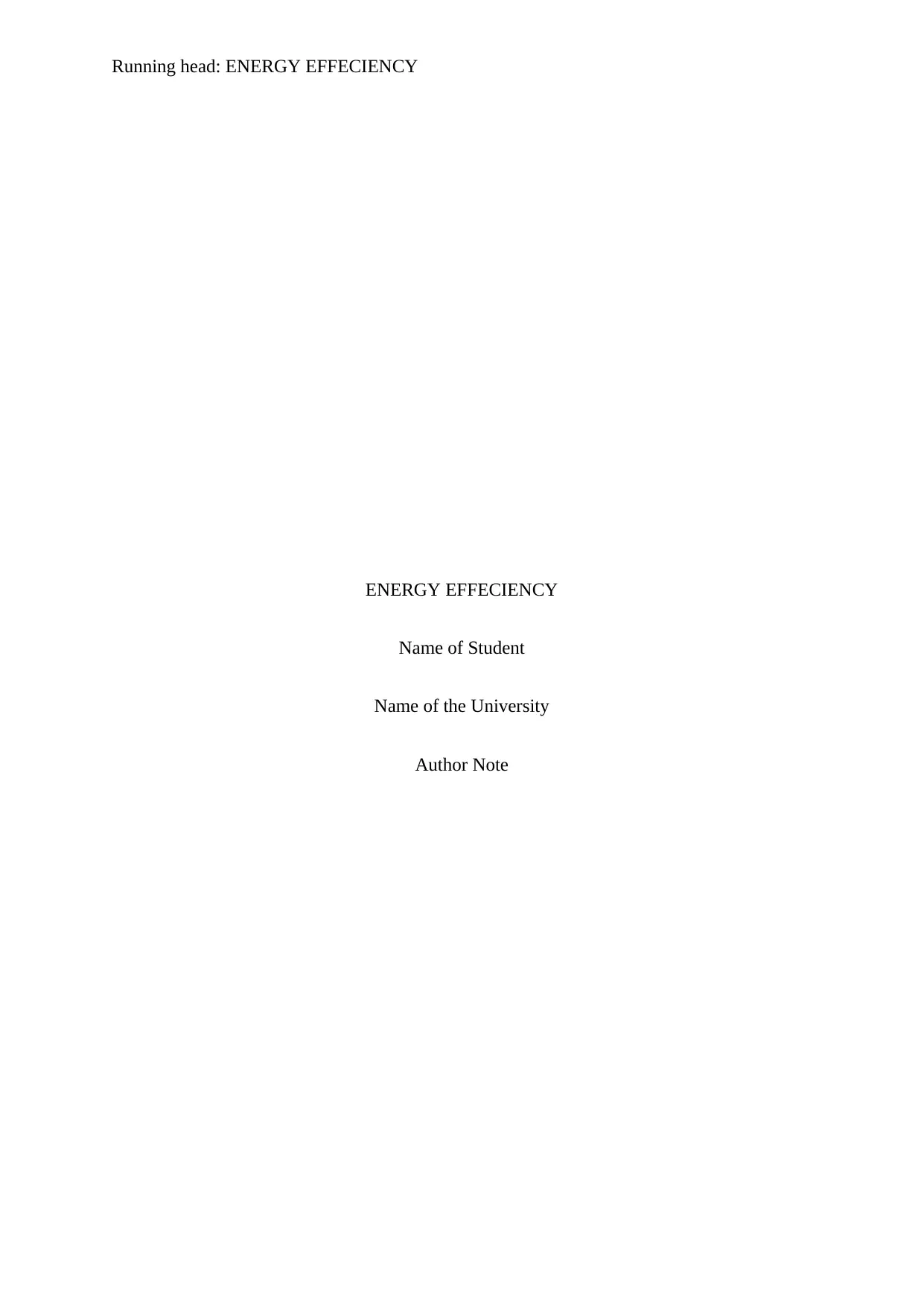
Running head: ENERGY EFFECIENCY
ENERGY EFFECIENCY
Name of Student
Name of the University
Author Note
ENERGY EFFECIENCY
Name of Student
Name of the University
Author Note
Paraphrase This Document
Need a fresh take? Get an instant paraphrase of this document with our AI Paraphraser
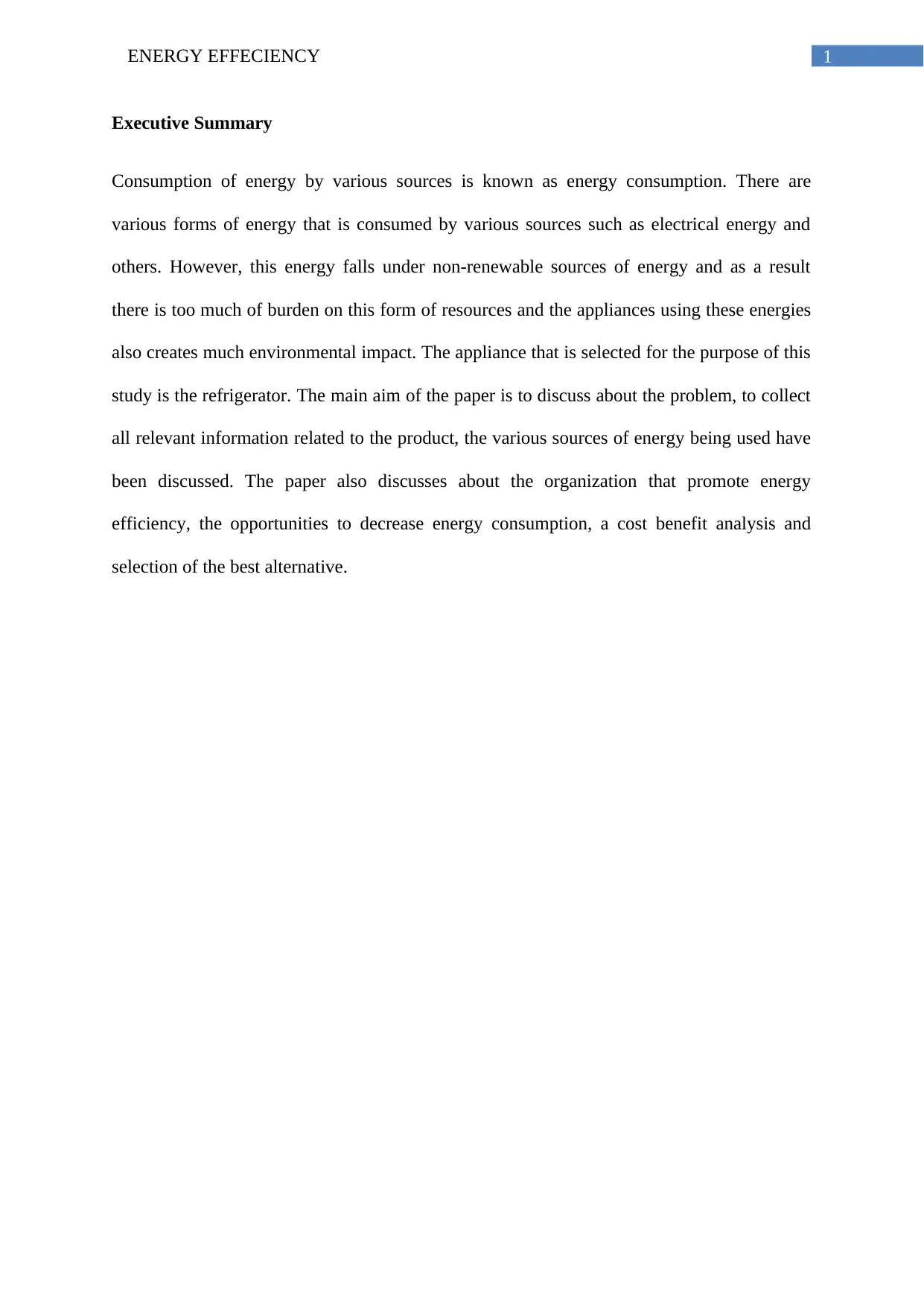
1ENERGY EFFECIENCY
Executive Summary
Consumption of energy by various sources is known as energy consumption. There are
various forms of energy that is consumed by various sources such as electrical energy and
others. However, this energy falls under non-renewable sources of energy and as a result
there is too much of burden on this form of resources and the appliances using these energies
also creates much environmental impact. The appliance that is selected for the purpose of this
study is the refrigerator. The main aim of the paper is to discuss about the problem, to collect
all relevant information related to the product, the various sources of energy being used have
been discussed. The paper also discusses about the organization that promote energy
efficiency, the opportunities to decrease energy consumption, a cost benefit analysis and
selection of the best alternative.
Executive Summary
Consumption of energy by various sources is known as energy consumption. There are
various forms of energy that is consumed by various sources such as electrical energy and
others. However, this energy falls under non-renewable sources of energy and as a result
there is too much of burden on this form of resources and the appliances using these energies
also creates much environmental impact. The appliance that is selected for the purpose of this
study is the refrigerator. The main aim of the paper is to discuss about the problem, to collect
all relevant information related to the product, the various sources of energy being used have
been discussed. The paper also discusses about the organization that promote energy
efficiency, the opportunities to decrease energy consumption, a cost benefit analysis and
selection of the best alternative.
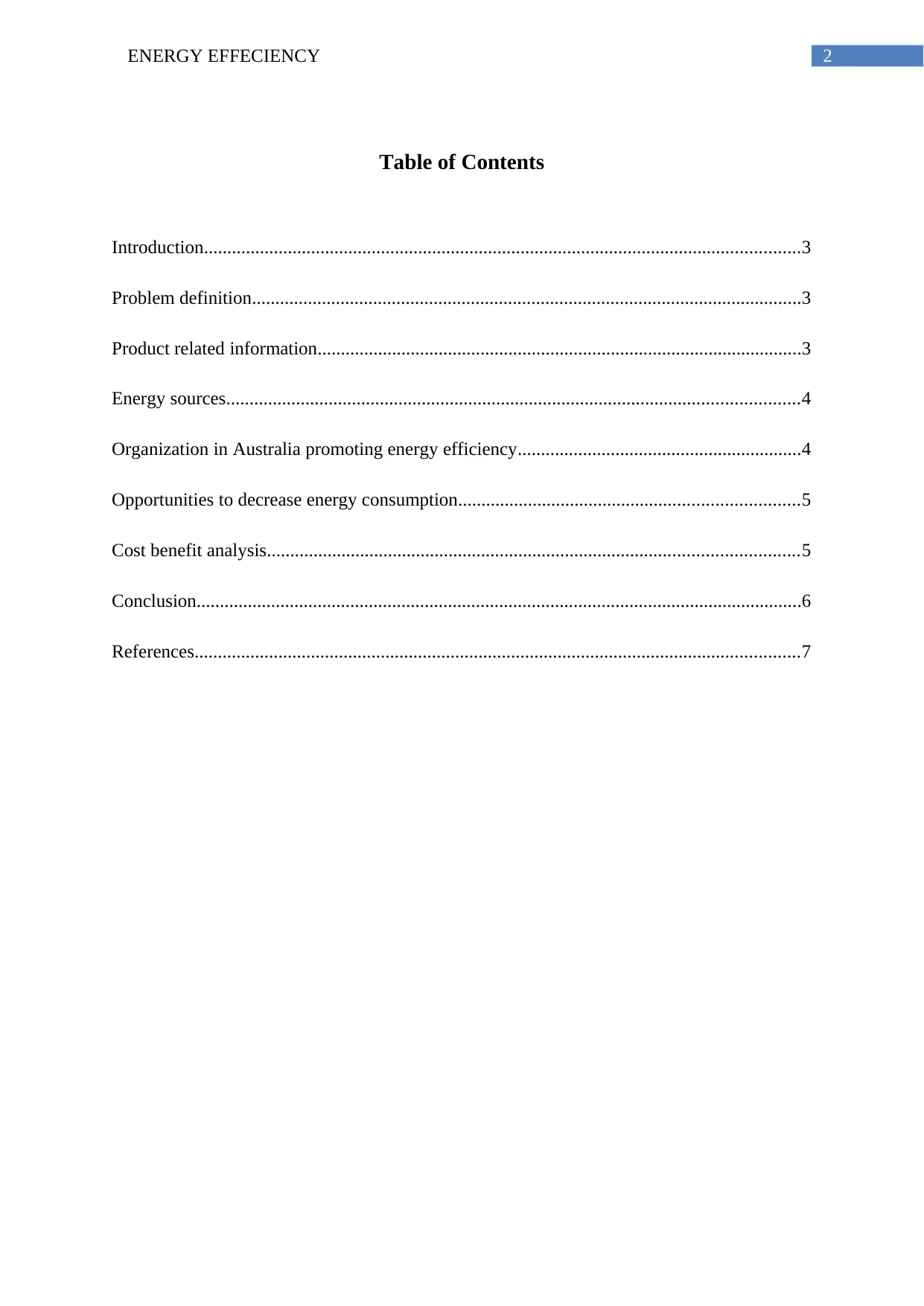
2ENERGY EFFECIENCY
Table of Contents
Introduction................................................................................................................................3
Problem definition......................................................................................................................3
Product related information........................................................................................................3
Energy sources...........................................................................................................................4
Organization in Australia promoting energy efficiency.............................................................4
Opportunities to decrease energy consumption.........................................................................5
Cost benefit analysis..................................................................................................................5
Conclusion..................................................................................................................................6
References..................................................................................................................................7
Table of Contents
Introduction................................................................................................................................3
Problem definition......................................................................................................................3
Product related information........................................................................................................3
Energy sources...........................................................................................................................4
Organization in Australia promoting energy efficiency.............................................................4
Opportunities to decrease energy consumption.........................................................................5
Cost benefit analysis..................................................................................................................5
Conclusion..................................................................................................................................6
References..................................................................................................................................7
⊘ This is a preview!⊘
Do you want full access?
Subscribe today to unlock all pages.

Trusted by 1+ million students worldwide
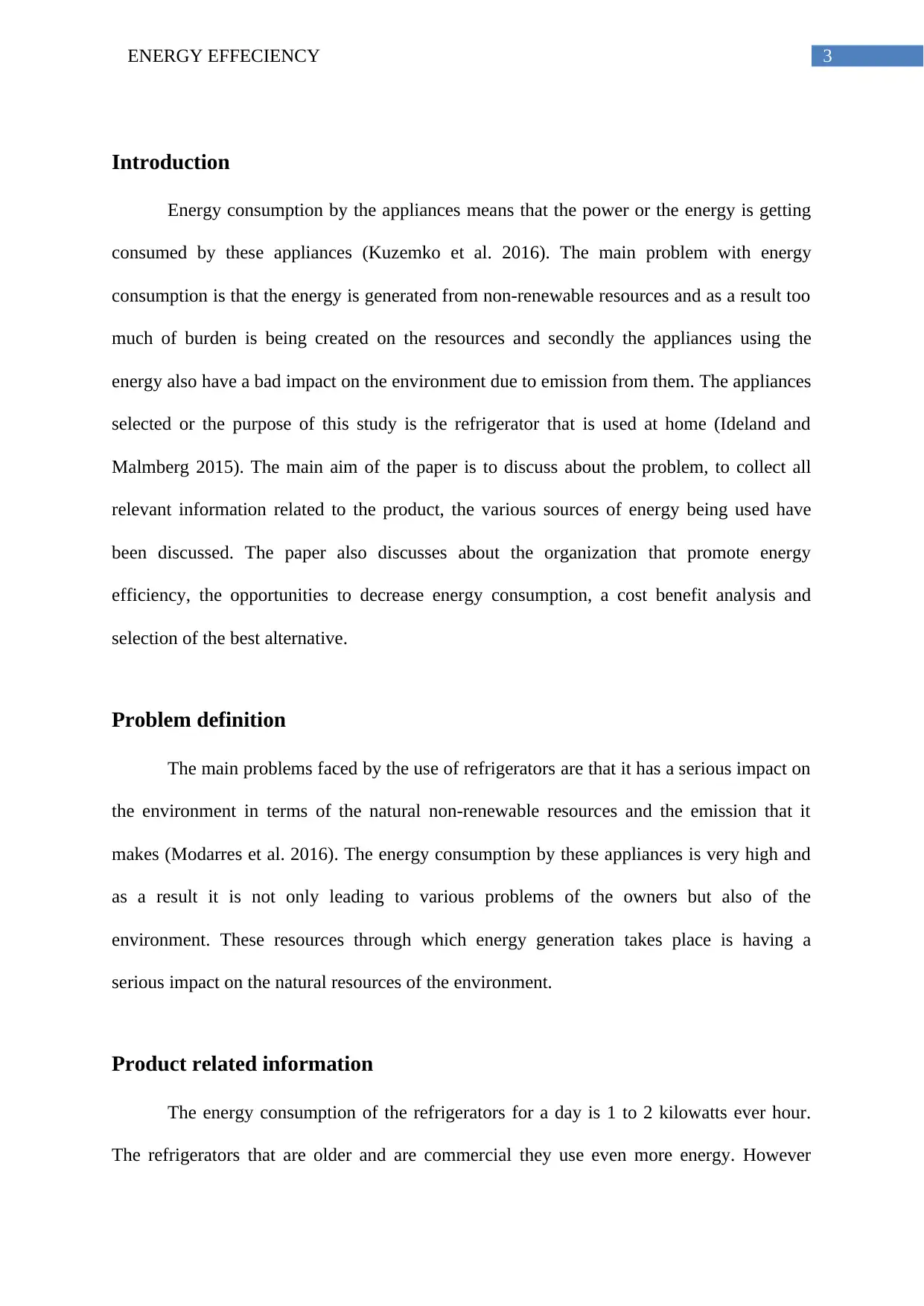
3ENERGY EFFECIENCY
Introduction
Energy consumption by the appliances means that the power or the energy is getting
consumed by these appliances (Kuzemko et al. 2016). The main problem with energy
consumption is that the energy is generated from non-renewable resources and as a result too
much of burden is being created on the resources and secondly the appliances using the
energy also have a bad impact on the environment due to emission from them. The appliances
selected or the purpose of this study is the refrigerator that is used at home (Ideland and
Malmberg 2015). The main aim of the paper is to discuss about the problem, to collect all
relevant information related to the product, the various sources of energy being used have
been discussed. The paper also discusses about the organization that promote energy
efficiency, the opportunities to decrease energy consumption, a cost benefit analysis and
selection of the best alternative.
Problem definition
The main problems faced by the use of refrigerators are that it has a serious impact on
the environment in terms of the natural non-renewable resources and the emission that it
makes (Modarres et al. 2016). The energy consumption by these appliances is very high and
as a result it is not only leading to various problems of the owners but also of the
environment. These resources through which energy generation takes place is having a
serious impact on the natural resources of the environment.
Product related information
The energy consumption of the refrigerators for a day is 1 to 2 kilowatts ever hour.
The refrigerators that are older and are commercial they use even more energy. However
Introduction
Energy consumption by the appliances means that the power or the energy is getting
consumed by these appliances (Kuzemko et al. 2016). The main problem with energy
consumption is that the energy is generated from non-renewable resources and as a result too
much of burden is being created on the resources and secondly the appliances using the
energy also have a bad impact on the environment due to emission from them. The appliances
selected or the purpose of this study is the refrigerator that is used at home (Ideland and
Malmberg 2015). The main aim of the paper is to discuss about the problem, to collect all
relevant information related to the product, the various sources of energy being used have
been discussed. The paper also discusses about the organization that promote energy
efficiency, the opportunities to decrease energy consumption, a cost benefit analysis and
selection of the best alternative.
Problem definition
The main problems faced by the use of refrigerators are that it has a serious impact on
the environment in terms of the natural non-renewable resources and the emission that it
makes (Modarres et al. 2016). The energy consumption by these appliances is very high and
as a result it is not only leading to various problems of the owners but also of the
environment. These resources through which energy generation takes place is having a
serious impact on the natural resources of the environment.
Product related information
The energy consumption of the refrigerators for a day is 1 to 2 kilowatts ever hour.
The refrigerators that are older and are commercial they use even more energy. However
Paraphrase This Document
Need a fresh take? Get an instant paraphrase of this document with our AI Paraphraser
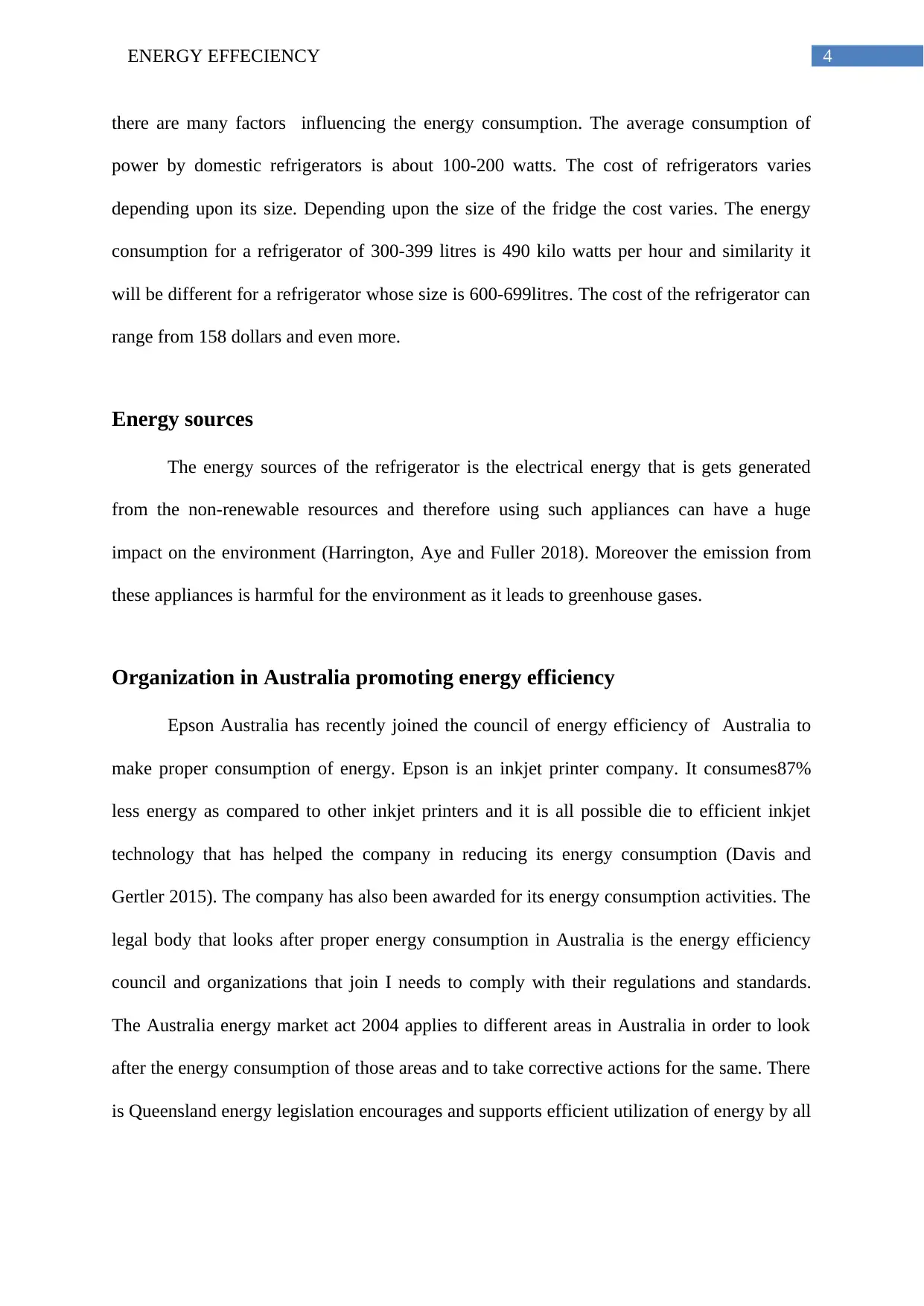
4ENERGY EFFECIENCY
there are many factors influencing the energy consumption. The average consumption of
power by domestic refrigerators is about 100-200 watts. The cost of refrigerators varies
depending upon its size. Depending upon the size of the fridge the cost varies. The energy
consumption for a refrigerator of 300-399 litres is 490 kilo watts per hour and similarity it
will be different for a refrigerator whose size is 600-699litres. The cost of the refrigerator can
range from 158 dollars and even more.
Energy sources
The energy sources of the refrigerator is the electrical energy that is gets generated
from the non-renewable resources and therefore using such appliances can have a huge
impact on the environment (Harrington, Aye and Fuller 2018). Moreover the emission from
these appliances is harmful for the environment as it leads to greenhouse gases.
Organization in Australia promoting energy efficiency
Epson Australia has recently joined the council of energy efficiency of Australia to
make proper consumption of energy. Epson is an inkjet printer company. It consumes87%
less energy as compared to other inkjet printers and it is all possible die to efficient inkjet
technology that has helped the company in reducing its energy consumption (Davis and
Gertler 2015). The company has also been awarded for its energy consumption activities. The
legal body that looks after proper energy consumption in Australia is the energy efficiency
council and organizations that join I needs to comply with their regulations and standards.
The Australia energy market act 2004 applies to different areas in Australia in order to look
after the energy consumption of those areas and to take corrective actions for the same. There
is Queensland energy legislation encourages and supports efficient utilization of energy by all
there are many factors influencing the energy consumption. The average consumption of
power by domestic refrigerators is about 100-200 watts. The cost of refrigerators varies
depending upon its size. Depending upon the size of the fridge the cost varies. The energy
consumption for a refrigerator of 300-399 litres is 490 kilo watts per hour and similarity it
will be different for a refrigerator whose size is 600-699litres. The cost of the refrigerator can
range from 158 dollars and even more.
Energy sources
The energy sources of the refrigerator is the electrical energy that is gets generated
from the non-renewable resources and therefore using such appliances can have a huge
impact on the environment (Harrington, Aye and Fuller 2018). Moreover the emission from
these appliances is harmful for the environment as it leads to greenhouse gases.
Organization in Australia promoting energy efficiency
Epson Australia has recently joined the council of energy efficiency of Australia to
make proper consumption of energy. Epson is an inkjet printer company. It consumes87%
less energy as compared to other inkjet printers and it is all possible die to efficient inkjet
technology that has helped the company in reducing its energy consumption (Davis and
Gertler 2015). The company has also been awarded for its energy consumption activities. The
legal body that looks after proper energy consumption in Australia is the energy efficiency
council and organizations that join I needs to comply with their regulations and standards.
The Australia energy market act 2004 applies to different areas in Australia in order to look
after the energy consumption of those areas and to take corrective actions for the same. There
is Queensland energy legislation encourages and supports efficient utilization of energy by all
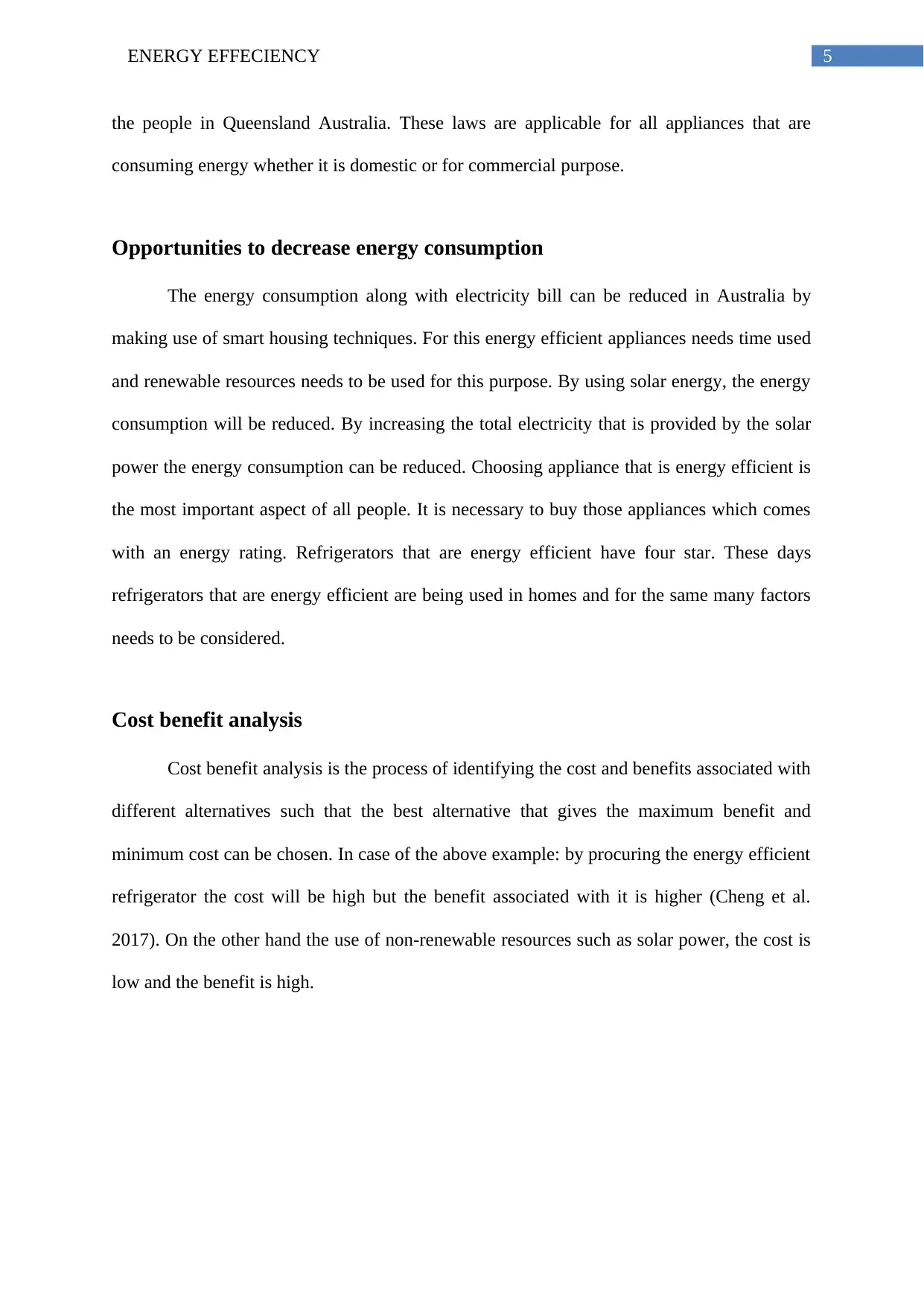
5ENERGY EFFECIENCY
the people in Queensland Australia. These laws are applicable for all appliances that are
consuming energy whether it is domestic or for commercial purpose.
Opportunities to decrease energy consumption
The energy consumption along with electricity bill can be reduced in Australia by
making use of smart housing techniques. For this energy efficient appliances needs time used
and renewable resources needs to be used for this purpose. By using solar energy, the energy
consumption will be reduced. By increasing the total electricity that is provided by the solar
power the energy consumption can be reduced. Choosing appliance that is energy efficient is
the most important aspect of all people. It is necessary to buy those appliances which comes
with an energy rating. Refrigerators that are energy efficient have four star. These days
refrigerators that are energy efficient are being used in homes and for the same many factors
needs to be considered.
Cost benefit analysis
Cost benefit analysis is the process of identifying the cost and benefits associated with
different alternatives such that the best alternative that gives the maximum benefit and
minimum cost can be chosen. In case of the above example: by procuring the energy efficient
refrigerator the cost will be high but the benefit associated with it is higher (Cheng et al.
2017). On the other hand the use of non-renewable resources such as solar power, the cost is
low and the benefit is high.
the people in Queensland Australia. These laws are applicable for all appliances that are
consuming energy whether it is domestic or for commercial purpose.
Opportunities to decrease energy consumption
The energy consumption along with electricity bill can be reduced in Australia by
making use of smart housing techniques. For this energy efficient appliances needs time used
and renewable resources needs to be used for this purpose. By using solar energy, the energy
consumption will be reduced. By increasing the total electricity that is provided by the solar
power the energy consumption can be reduced. Choosing appliance that is energy efficient is
the most important aspect of all people. It is necessary to buy those appliances which comes
with an energy rating. Refrigerators that are energy efficient have four star. These days
refrigerators that are energy efficient are being used in homes and for the same many factors
needs to be considered.
Cost benefit analysis
Cost benefit analysis is the process of identifying the cost and benefits associated with
different alternatives such that the best alternative that gives the maximum benefit and
minimum cost can be chosen. In case of the above example: by procuring the energy efficient
refrigerator the cost will be high but the benefit associated with it is higher (Cheng et al.
2017). On the other hand the use of non-renewable resources such as solar power, the cost is
low and the benefit is high.
⊘ This is a preview!⊘
Do you want full access?
Subscribe today to unlock all pages.

Trusted by 1+ million students worldwide
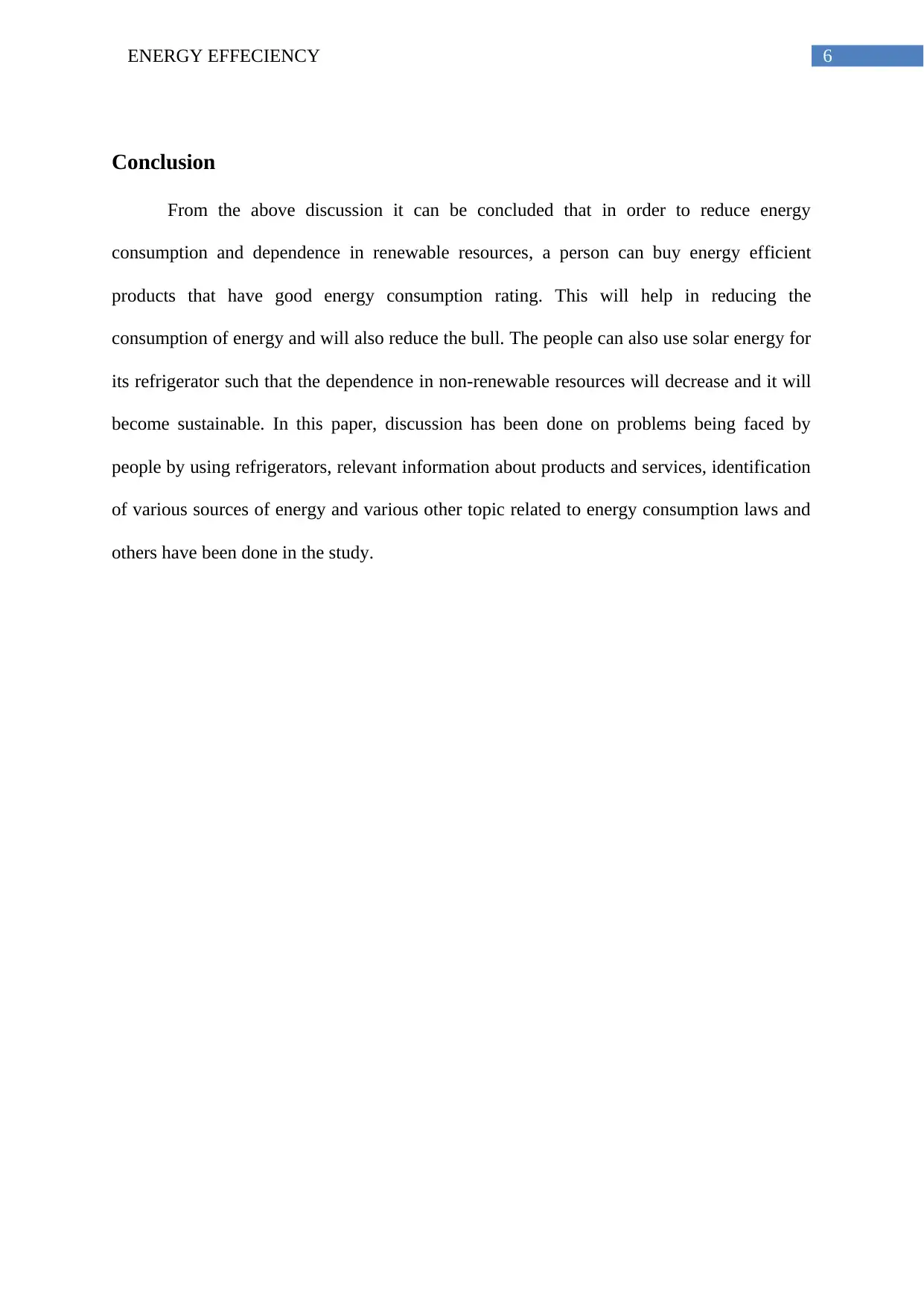
6ENERGY EFFECIENCY
Conclusion
From the above discussion it can be concluded that in order to reduce energy
consumption and dependence in renewable resources, a person can buy energy efficient
products that have good energy consumption rating. This will help in reducing the
consumption of energy and will also reduce the bull. The people can also use solar energy for
its refrigerator such that the dependence in non-renewable resources will decrease and it will
become sustainable. In this paper, discussion has been done on problems being faced by
people by using refrigerators, relevant information about products and services, identification
of various sources of energy and various other topic related to energy consumption laws and
others have been done in the study.
Conclusion
From the above discussion it can be concluded that in order to reduce energy
consumption and dependence in renewable resources, a person can buy energy efficient
products that have good energy consumption rating. This will help in reducing the
consumption of energy and will also reduce the bull. The people can also use solar energy for
its refrigerator such that the dependence in non-renewable resources will decrease and it will
become sustainable. In this paper, discussion has been done on problems being faced by
people by using refrigerators, relevant information about products and services, identification
of various sources of energy and various other topic related to energy consumption laws and
others have been done in the study.
Paraphrase This Document
Need a fresh take? Get an instant paraphrase of this document with our AI Paraphraser
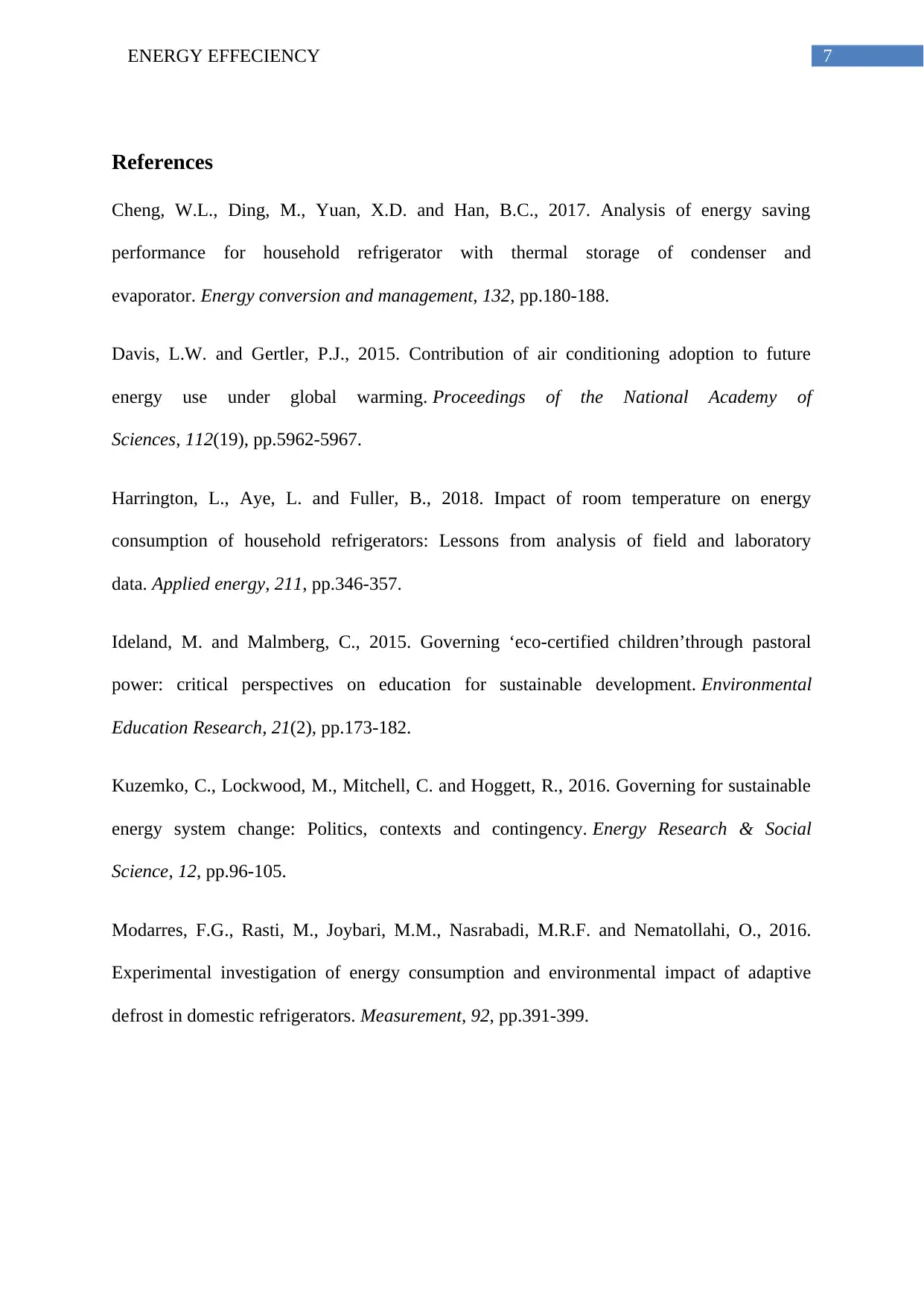
7ENERGY EFFECIENCY
References
Cheng, W.L., Ding, M., Yuan, X.D. and Han, B.C., 2017. Analysis of energy saving
performance for household refrigerator with thermal storage of condenser and
evaporator. Energy conversion and management, 132, pp.180-188.
Davis, L.W. and Gertler, P.J., 2015. Contribution of air conditioning adoption to future
energy use under global warming. Proceedings of the National Academy of
Sciences, 112(19), pp.5962-5967.
Harrington, L., Aye, L. and Fuller, B., 2018. Impact of room temperature on energy
consumption of household refrigerators: Lessons from analysis of field and laboratory
data. Applied energy, 211, pp.346-357.
Ideland, M. and Malmberg, C., 2015. Governing ‘eco-certified children’through pastoral
power: critical perspectives on education for sustainable development. Environmental
Education Research, 21(2), pp.173-182.
Kuzemko, C., Lockwood, M., Mitchell, C. and Hoggett, R., 2016. Governing for sustainable
energy system change: Politics, contexts and contingency. Energy Research & Social
Science, 12, pp.96-105.
Modarres, F.G., Rasti, M., Joybari, M.M., Nasrabadi, M.R.F. and Nematollahi, O., 2016.
Experimental investigation of energy consumption and environmental impact of adaptive
defrost in domestic refrigerators. Measurement, 92, pp.391-399.
References
Cheng, W.L., Ding, M., Yuan, X.D. and Han, B.C., 2017. Analysis of energy saving
performance for household refrigerator with thermal storage of condenser and
evaporator. Energy conversion and management, 132, pp.180-188.
Davis, L.W. and Gertler, P.J., 2015. Contribution of air conditioning adoption to future
energy use under global warming. Proceedings of the National Academy of
Sciences, 112(19), pp.5962-5967.
Harrington, L., Aye, L. and Fuller, B., 2018. Impact of room temperature on energy
consumption of household refrigerators: Lessons from analysis of field and laboratory
data. Applied energy, 211, pp.346-357.
Ideland, M. and Malmberg, C., 2015. Governing ‘eco-certified children’through pastoral
power: critical perspectives on education for sustainable development. Environmental
Education Research, 21(2), pp.173-182.
Kuzemko, C., Lockwood, M., Mitchell, C. and Hoggett, R., 2016. Governing for sustainable
energy system change: Politics, contexts and contingency. Energy Research & Social
Science, 12, pp.96-105.
Modarres, F.G., Rasti, M., Joybari, M.M., Nasrabadi, M.R.F. and Nematollahi, O., 2016.
Experimental investigation of energy consumption and environmental impact of adaptive
defrost in domestic refrigerators. Measurement, 92, pp.391-399.
1 out of 8
Related Documents
Your All-in-One AI-Powered Toolkit for Academic Success.
+13062052269
info@desklib.com
Available 24*7 on WhatsApp / Email
![[object Object]](/_next/static/media/star-bottom.7253800d.svg)
Unlock your academic potential
Copyright © 2020–2026 A2Z Services. All Rights Reserved. Developed and managed by ZUCOL.




